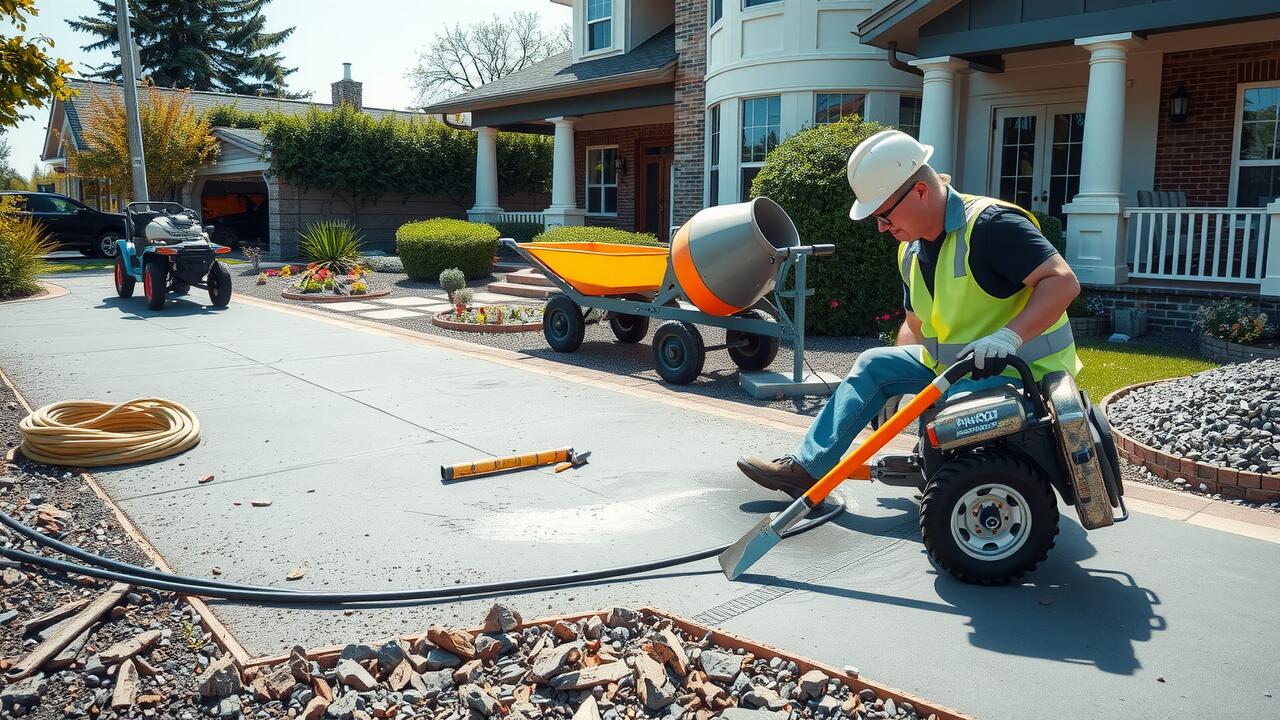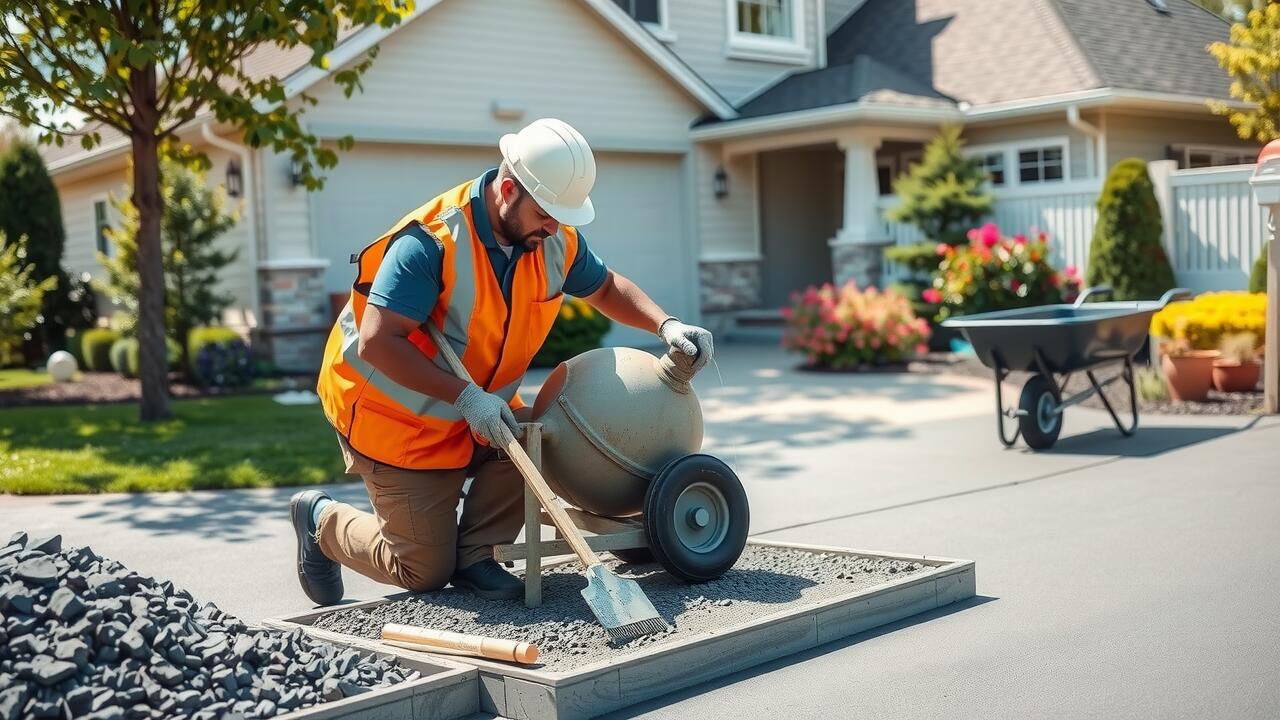
Regional Preferences in Driveway Types
Regional preferences for driveway types often reflect local climate, topography, and cultural influences. In areas with heavy rainfall or snow, homeowners typically favor materials that can withstand harsh weather conditions. Concrete and asphalt driveways are common choices in urban environments due to their durability and ease of installation. Conversely, more rural settings may see a trend towards gravel or brick driveways, which complement the natural landscape and offer a unique aesthetic appeal.
Driveway installation varies by region based on these preferences. In the South, for example, homeowners often opt for decorative concrete or interlocking pavers that can withstand the heat and humidity. In contrast, the Northwest might see an inclination towards permeable options that promote drainage and reduce runoff in areas prone to heavy rain. Tailoring driveway choices to meet local expectations not only enhances the property’s value but also ensures functionality within the community context.
Tailoring Choices to Local Trends
Understanding regional preferences plays a crucial role in choosing the right driveway design. Homeowners should consider the materials and styles popular in their area. For instance, suburban neighborhoods may prioritize concrete or asphalt for their durability, while more rural settings might favor gravel or stone for aesthetics and cost-effectiveness. Aligning with local trends can significantly enhance a property’s appeal.
Driveway installation choices should reflect not only personal taste but also community standards. Influences such as climate, local architecture, and neighborhood demographics can guide decisions. A driveway that harmonizes with surrounding homes often increases property value. Additionally, selecting a driveway style that resonates with regional characteristics may attract potential buyers, ensuring a strong return on investment.
Eco-Friendly Driveway Options
Eco-friendly driveway options are increasingly popular among homeowners seeking sustainable choices. Materials such as permeable pavers and recycled asphalt not only reduce environmental impact but also provide practical benefits. Permeable pavers allow water to pass through, minimizing runoff and promoting groundwater recharge. Recycled asphalt offers a durable alternative that repurposes old materials, reducing the demand for new resources.
When considering driveway installation, selecting eco-friendly materials can enhance a property’s value while contributing to environmental sustainability. Homeowners can also explore options like crushed stone or gravel, which require less energy to produce and can blend seamlessly with natural landscapes. Adopting green practices in driveway design can attract environmentally conscious buyers and improve the overall appeal of a home.
Benefits of Sustainable Materials
Sustainable materials in driveway installation offer a host of benefits that appeal to environmentally conscious homeowners. Using products like permeable pavers, recycled asphalt, or reclaimed concrete reduces the ecological footprint associated with traditional driveway options. These materials often require less energy to produce and can contribute to reduced landfill waste, making them a greener alternative.
Moreover, sustainable driveways can enhance property value while providing long-term economic advantages. Durable materials tend to require less maintenance and offer greater longevity compared to their conventional counterparts. This reliability translates to savings over time, as homeowners face fewer repair costs. Investing in sustainable options not only benefits the planet but also proves to be a wise financial decision.
Enhancing Functionality with Driveway Design
A well-designed driveway can significantly enhance both accessibility and usability. When planning a driveway installation, it is essential to consider factors such as size, shape, and materials. Wider driveways can accommodate multiple vehicles, providing convenience for larger households or guests. Consideration for additional features like turnarounds or angles can further improve traffic flow, ensuring that residents do not struggle with tight spaces.
Incorporating effective drainage solutions in driveway design is crucial. A driveway installation that includes proper slope and drainage channels can prevent water pooling, reducing potential damage over time. This not only extends the lifespan of the driveway but also minimizes maintenance costs. Additionally, integrating landscaping elements, such as borders or carefully placed plants, can enhance the aesthetic value while maintaining functionality.
Incorporating Features Like Drainage and Space
Effective driveway design goes beyond surface aesthetics; it incorporates practical features like drainage and space optimization. Proper drainage systems divert water away from the driveway, preventing pooling and reducing maintenance needs. This not only extends the life of the surface materials but also protects the surrounding landscape from erosion. Integrating these systems during the driveway installation process ensures functionality is prioritized alongside visual appeal.
Space is another crucial element to consider during driveway installation. Adequate width allows for easy access and parking, accommodating multiple vehicles without creating congestion. Additionally, thoughtful design can incorporate space for landscaping or additional features like lighting and pathways, further enhancing curb appeal. When a driveway meets both functional and aesthetic needs, it often sees a positive impact on property value.
FAQS
What type of driveway is most popular in urban areas?
In urban areas, concrete and asphalt driveways tend to be the most popular due to their durability, low maintenance, and ability to withstand heavy traffic.
How can eco-friendly driveways increase property value?
Eco-friendly driveways made from sustainable materials can increase property value by appealing to environmentally conscious buyers and potentially lowering long-term maintenance costs.
What features should I consider for enhancing driveway functionality?
Consider incorporating features like proper drainage systems, ample space for parking, and even decorative elements that complement your home’s aesthetics to enhance driveway functionality.
Are there specific driveway materials that are better for resale value?
Yes, materials like stamped concrete, pavers, and natural stone often provide better resale value due to their aesthetic appeal and durability, making them attractive to potential buyers.
How can regional trends influence my driveway choice?
Regional trends influence driveway choices as different areas may have specific preferences based on climate, local regulations, and aesthetic styles, so it’s important to tailor your driveway selection to what’s popular and functional in your location.
